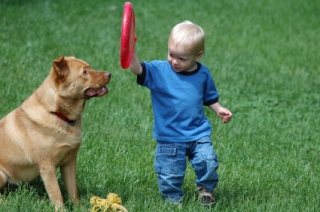What is anthropomorphism?

Anthropomorphism is "the attribution of uniquely human characteristics to non-human creatures and beings, phenomena, material states and objects or abstract concepts." It's a natural human tendency that is almost unavoidable, and something we need to be conscious of when we are dealing with our dogs. We often put very human ideas and feeling into our dog's heads — and they don't really belong there.
It's easy to come up with unhelpful examples of anthropomorphism:
A case could be made for much of the training based on pack theory being a big exercise in anthropomorphism. Are dogs really keeping a mental tally of who is in charge based on who walks in front of whom or enters a doorway first? Are dogs really in a constant battle with us for supremacy? Or is this just an example of something that an insecure human frets over?
Many house-training issues end up being anthropomorphized. People believe that dogs leave messes because they are angry when people go out for the day. And of course, when they come home they believe the dogs "know they did bad" because of an anthropomorphic misinterpretation of the look on their dog's face.
But is anthropomorphism always bad?
Alexandra Horowitz, who published the research on the "guilty look" and recently published "Inside of A Dog: What Dogs See, Smell, and Know", has an interesting paper she co-authored with Marc Bekoff on her Barnard College web site.
The paper contains a very interesting discussion on anthropomorphism and how it may be useful for analyzing and exploring animal behavior. Many consider it to be dangerous, as Horowitz and Bekoff indicate:
(some believe) using anthropomorphisms in the study of animal behavior is "dangerous," an "incubus" from which the field must "struggle to free itself" (Kennedy 1992); an "incurable disease," having "no place in a scientific study" (Kennedy 1992); uncritical, naive, and sloppy (summarized by, e.g., Burghardt 1985; Fisher 1996; Mitchell, Thompson and Miles 1997; Crist 1999); and the recent resurgence in such attributions "risks bringing back the dirty bathwater as we rescue the baby" (Wynne 2004).
These assertions are not unwarranted - assigning thoughts and/or emotions to a creature when they are not there is unscientific. But is it really possible to completely remove our human perceptions from our analysis of how and why our dogs do what they do? Horowitz and Bekoff make the argument that it is probably inevitable (even citing another recent paper by Bekoff) and I agree. While anthropomorphism can lead to some unfortunate practices in training, to pretend that it is possible to completely stop it is an exercise in futility.
The paper has a fascinating analysis of a study Horowitz did of human-dog play, and relates it to anthropomorphism. When we play with our dogs we are in steady, if not constant, communication. Are we subconsciously "translating" from dog to human while this is going on? Or is this a situation where our desire to assign human thoughts to our dogs is good, maybe even accurate most of the time? I think that both species need to have some sort of a limited ability to "get into each others heads" in order for the play to succeed.
It's important to be mindful when you communicate with your dog. You are talking to a different species after all. But it's OK to be human too. After all, it's not like you can help it.




